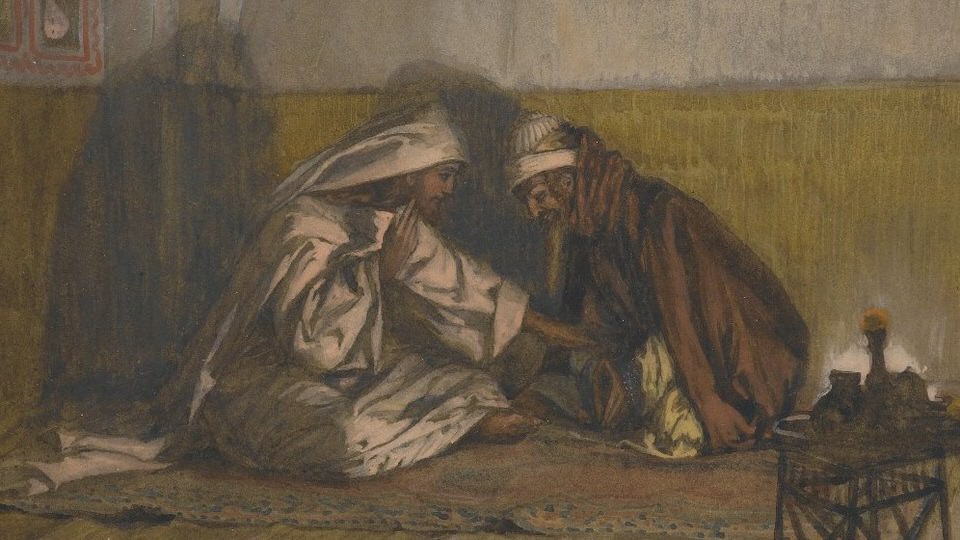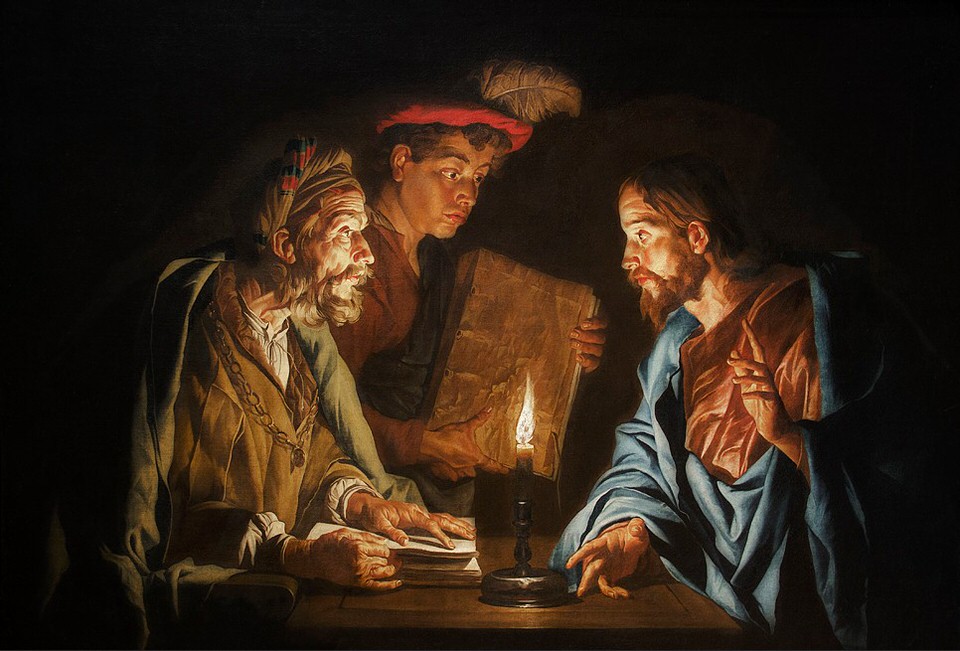

Nicodemus: “How can a man be born when he is old?” (Jn 3:4)
Pope Francis
Wednesday, June 8, 2022

Detail of Interview Between Jesus and Nicodemus by James Tissot. Image courtesy of the Brooklyn Museum
In the 13th instalment of his catechesis on old age, Pope Francis reflects on the words Jesus spoke to the Jewish leader Nicodemus: “No one can see the kingdom of God without being born anew” (John 3:3). Read the full text below:Dear brothers and sisters, good morning! Among the most relevant elderly characters in the Gospels is Nicodemus – one of the Jewish leaders – who, wanting to know Jesus, went to him at night, although in secret (cf. Jn 3:1-21). In the conversation between Jesus and Nicodemus, the core of Jesus’s revelation and his redemptive mission emerge when he says, “For God so loved the world, that he gave his only Son, that whoever believes in him should not perish but have eternal life” (v. 16). Jesus says to Nicodemus that to “see the kingdom of God”, one needs “to be born again from above” (cf. v. 3). This does not mean starting over from birth, of repeating our coming into the world, hoping that a new reincarnation will open up the chance of having a better life. Repeating that makes no sense. It would, rather, empty all meaning out of the life we have lived, erasing it as if it were a failed experiment, a value that has expired, a wasted void. No, that’s not what this is, this being born again that Jesus speaks of. It is something else. This life is precious in God’s eyes – it identifies us as beings who are loved tenderly by God. This “birth from above” that allows us to “enter” the kingdom of God is a generation in the Spirit, a passage through the waters toward the promised land of a creation reconciled with the love of God. It is a rebirth from above with the grace of God. It is not being reborn physically another time. Nicodemus misunderstands this birth and calls it into question using old age as evidence of its impossibility: human beings inevitably get old, the dream of an eternal youth permanently retreats, culmination is the destiny of any birth in time. How can anyone imagine a destination that takes the form of birth? This is how Nicodemus thinks and he cannot find a way to understand Jesus’s words. What exactly is this rebirth? Nicodemus’s objection is very instructive for us. We can, in fact, turn it upside down, in the light of Jesus’s word, with the discovery of a mission proper to old age. Indeed, being old is not only not an obstacle to the being born from above that Jesus speaks of, but it becomes the opportune time to illuminate it, disassociating it from being equated with lost hope. Our epoch and our culture, which demonstrates a worrisome tendency to consider the birth of a child as the simple matter of the production and biological reproduction of the human being, cultivate the myth of eternal youth as the desperate obsession with an incorruptible body. Why is old age not appreciated in so many ways? Because it bears the undeniable evidence of the end of this myth, that makes us want to return to our mother’s womb always to return with a young body. Technology is fascinated by this myth in every way. While awaiting the defeat of death, we can keep the body alive with medicine and cosmetics which slow down, hide, erase old age. Naturally, well-being is one thing, the myth that feeds it is another. There is no denying, however, that the confusion between the two is creating a certain mental confusion in us. To confuse well-being with feeding the myth of eternal youth. Everything is done to always have this youth – so much make-up, so many surgical interventions to appear young. The words of a wise Italian actress, [Anna] Magnani, come to mind, when they told her she had to remove her wrinkles and she said, “No, don’t touch them! It took so many years to have them – don’t touch them!” This is what wrinkles are: a sign of experience, a sign of life, a sign of maturity, a sign of having made a journey. Do not touch them to become young, that your face might look young. What matters is the entire personality; it’s the heart that matters, and the heart remains with the youth of good wine – the more it ages the better it is. Life in our mortal flesh is a beautiful “unfinished” reality, like certain works of art that exert a unique fascination precisely due to their incompleteness. For life down here is an “initiation”, not the fulfillment. We come into the world just like this, like real people, like people who advance in age but who are always real. But life in our mortal flesh is too small a space and time to keep it intact and to bring to fulfillment in the world’s time the most precious part of our existence. Jesus says that faith, that welcomes the evangelical proclamation of the kingdom of God to which we are destined, contains an extraordinary primary effect. It enables us to “see” the kingdom of God. We become capable of truly seeing the many signs of the approximation of our hope of the fulfillment, of that which bears in our life the sign of being destined for eternity in God. The signs are those of evangelical love illuminated by Jesus in many ways. And if we can “see” them, we can also “enter” into the kingdom through the passage of the Spirit through the waters that regenerate. Old age is the condition granted to many of us in which the miracle of this birth from above can be intimately assimilated and rendered credible for the human community. It does not communicate a nostalgia for a birth in time, but of a love for our final destination. In this perspective, old age has a unique beauty – we are journeying toward the Eternal. No one can re-enter their mother’s womb, not even using its technological and consumeristic substitute. This is not wisdom; this is not a journey that has been accomplished; this is artificial. That would be sad, even if it were possible. The elderly person moves ahead; the elderly person journeys toward the final destination, towards God’s heaven; the elderly person journeys with the wisdom of lived experience. Old age, therefore, is a special time of disassociating the future from the technocratic illusion of a biological and robotic survival, especially because it opens one to the tenderness of the creative and generative womb of God. I would like to emphasize this word here – the tenderness of the elderly. Watch how a grandfather or a grandmother look at their grandchildren, how they embrace their grandchildren – that tenderness, free of any human distress, that has conquered the trials of life and is able to give love freely, the loving nearness of one person to others. This tenderness opens the door toward understanding God’s tenderness. This is what God is like, he knows how to embrace. And old age helps us understand this aspect of God who is tenderness. Old age is the special time of disassociating the future from the technocratic illusion, it is the time of God’s tenderness that creates, creates a path for all of us. May the Spirit grant us the re-opening of this spiritual – and cultural – mission of old age that reconciles us with the birth from above. When we think of old age like this, we can say – why has this throw-away culture decided to throw out the elderly, considering them useless? The elderly are the messengers of the future, the elderly are the messengers of tenderness, the elderly are the messengers of the wisdom of lived experience. Let us move forward and watch the elderly. Text courtesy of Libreria Editrice Vaticana
Pope Francis' General Audience airs every Thursday at 7 pm ET / 4 pm PT (and again at 11 pm ET / 8 pm PT) on Salt + Light TV.
You can also watch the latest General Audience any time on Salt + Light Plus.

Jesus Christ and Nicodemus by Matthias Stom (Source: Wikimedia Commons)
Related Articles:
<<













